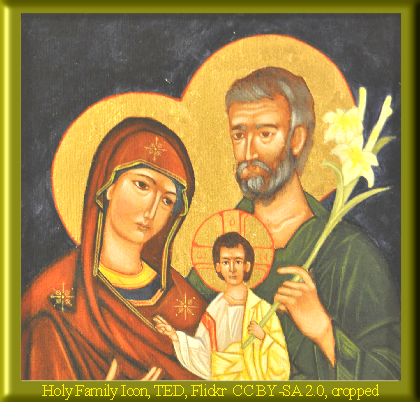26 December 2021 – Feast of the Holy Family
God’s Children: that is what we are
1 Samuel 1:20-22, 24-28 1 John:1-2, 21-24 Luke 2:41-52
On this Feast of the Holy Family we are invited to reflect on the importance of family in our lives as God’s children, and on the values that underpin and sustain it. Created in the image of a God who is Love-in-Community (Trinity), the meaning of our lives is to be found in relationships. Our identity as human beings is inseparable from that network of relationships we call ‘family’ – not just the family into which we are born and in which we grow up, but the wider family of friends and relations, of county and country, of Church, of all humanity and, indeed, of all God’s creatures, great and small, with whom we are inextricably connected. And our final destiny is to belong to the family of the blessed in heaven. We might say then that family is inscribed in our DNA. It is part of who and what we are. All this is all beautifully captured in the Africa philosophy of Ubuntu, which is best translated as ‘I am because we are’.
All today’s readings highlight important family values. Our reading from the first book of Samuel recounts the birth of Israel’s first prophet, Samuel, a name which means ‘I asked the Lord for him’ (1 Sam 1:20). His mother, Hannah, sees Samuel not as her possession, but as a gift from God, and a sign of God’s favour to her. So she decides, as soon as he is weaned, to dedicate him to the Lord: ‘Now I make him over to the Lord for the whole of his life (1 Sam 1:28). We know that, when Samuel grew up, he made that dedication his own and went on to play a very important role in the history of Israel. The reading reminds us that all children are gifts of God. They do not belong to their parents. In the words of the Lebanese poet, Khalil Gibran, speaking to parents: ‘They come through you but not from you,/And though they are with you yet they belong not to you.’
Our second reading from the First Letter of St John, re-affirms and deepens the message of the first reading. We are not only gifts of God. We are God’s children: ‘Think of the love that the Father has lavished on us, by letting us be called God’s children, and that is what we are’ (1 Jn 3:1-2). Today, some people say, with wonder in their voices, ‘We are stardust’. This, of course, is true, and it is wonderful. But our deeper identity as God’s children is a far greater cause for wonder – for wonder and for gratitude. It is also a constant challenge because we must not take that sublime identity for-granted. We must live and act in accordance with it. In the words of St John, we must ‘live the kind of life that pleases God’ (1 Jn 3:22)
In the gospel we have Luke’s dramatic account of the finding of the boy, Jesus, in the Temple. At one level, it is a very human story that resonates with parents whose children go missing. Jesus is now a boy of twelve and his parents, Mary and Joseph, take him with them to Jerusalem to celebrate the feast of the Passover. When the feast is over, Mary and Joseph, along with their ‘caravan’, set out on the return journey to Nazareth. Only after a day’s journey do they realise that Jesus is missing. [It’s a bit like what happened in the popular movie ‘Home Alone’]. Then begins the frantic search for him. And, after three days of searching everywhere – three days of what must have been unimaginable distress and torment for Joseph and Mary – they find him, Luke tells us, ‘in the Temple, sitting among the doctors, listening to them, and asking them questions’ (Lk 2:46).
On finding him, Mary, clearly distraught, speaks very sternly to her son: ‘Why have you done this to us; see how worried your father and I have been, looking for you’ (Lk 2:48). Jesus’ enigmatic reply can only have deepened their anguish: ‘Why were you looking for me? Did you not know that I must be in my Father’s house?’ (Lk 2:49). Luke tells us that Mary and Joseph “did not understand what he meant” (Lk 2:50). Then he adds an important statement about how Mary deals with her puzzlement at what her Son has done: “Mary stored up all these things in her heart” (Lk 2: 51). The story ends with Jesus returning to Nazareth with Mary and Joseph and living under their authority. Here is surely a lesson here is how tensions in a family can be resolved through listening, reflecting and accepting things we may never fully understand about a wife or husband or ‘our’ children.
As with most of Luke’s stories, this story of Jesus’ apparently ‘strange’ behaviour has a deeper layer of meaning. It shows Jesus beginning to awaken to his identity as ‘Son of the Most High’, at home in his Father’s house. Jesus appears quite at ease sitting among the doctors in the temple, listening to them and asking them questions. And these learned men are awestruck at his wisdom and his answers. Up to now, Luke had introduced us to a series of witnesses who proclaim the divine identity of the infant Jesus before he can speak for himself. Now, as Jesus is on the verge of adulthood, he is given his own voice. He is the Son of God as well as the son of Mary. He belongs to a divine family which has a prior claim on his life. Like Mary and Joseph, we too are invited to ponder and acknowledge the divine identity of Jesus. ‘Come, let us adore him, Christ, the Lord’. Amen.
Michael McCabe SMA, December 2021

